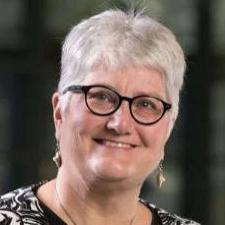The University of Wisconsin School of Medicine and Public Health (UWSMPH) has been selected by the American Medical Association Foundation as the inaugural institution for the National LGBTQ+ Fellowship Program aimed at transforming the health equity landscape for the LGBTQ+ community. The program will be housed in the UW Department of Family Medicine and Community Health (DFMCH), and will build on the school and health system’s existing foundations of diversity, equity, and inclusion strategies that support affirming LGBTQ+ services and will accelerate education, research and clinical initiatives.
A total of $750,000 in funding from the foundation over four years will establish an advanced fellowship clinical training program for early-career physicians in primary care – who are “first-contact” doctors for their patients’ medical needs – in ways to optimize the health of LGBTQ+ patients.

Dr. Elizabeth Petty
The ultimate goal of the program is to ensure that all LGBTQ+ patients receive the highest standards of care, according to Dr. Elizabeth Petty, senior associate dean for academic affairs at the SMPH, and the principal investigator and program director for the interdisciplinary fellowship program.
“This funding provides a very exciting and critically important opportunity to integrate primary care and public health in highly innovative ways that will significantly accelerate needed change to optimize the health of LGBTQ+ and gender expansive individuals,” she said.
The first fellow will be recruited to begin their training for the year-long clinically focused academic program in July 2022. Fellows will have opportunities to extend their training beyond one year to do additional scholarship to advance LGBTQ+ health equity. The program will accept one fellow each year thereafter, with a goal of recruiting three fellows per year annually by the fifth year.
“We are delighted that the DFMCH will be the administrative home for this innovative fellowship,” said William Schwab, MD, DFMCH professor and vice chair of education. “It is fully consistent with our department’s core missions of excellent clinical care for all people, dynamic education, meaningful community partnerships, and outstanding scholarship. We welcome this opportunity to collaborate with our primary care colleagues to develop an exceptional model of advanced medical education to enhance the health of LGBTQ+ individuals.”
Physician fellows will undergo clinical and classroom training in LGBTQ+ health care and will engage in research, teaching, mentoring, community collaborative partnership efforts and other scholarly endeavors.
Several studies show that LGBTQ+ individuals experience higher rates of depression, increased suicide risk and reduced access to appropriate and timely preventative health care for chronic diseases such as cancer and heart disease. Dr. Ronni Hayon, DFMCH associate professor, understands the challenges and complexities facing her community.
“LGBTQIA+ individuals are a part of a diverse and beautiful community, but one thing we have in common with one another is that we experience health inequities in multiple areas of physical and emotional health which are rooted in complex systems of stigmatization and oppression,” she said. “What I love about this fellowship is that it will help train physicians to provide care that is more than just ‘competent.’ Graduating fellows will be able to go on to provide truly affirming care and advocate for change so that LGBTQIA+ folx and their families can thrive.”
The award marks the first chapter in the foundation’s nationwide effort to train hundreds of fellows and to foster development of multi-disciplinary standards of care for LGBTQ+ individuals. The goal is to establish a workforce of physicians fluent in LGBTQ+ health care as well as a rich body of medical knowledge about best practices in caring for LGBTQ+ patients that can be disseminated throughout the academic medicine community.
In a stringent peer-reviewed process, the AMA Foundation selected the SMPH for the award due to its extensive multidisciplinary network of institutional and community leaders with expertise in LGBTQ+ health.
“I am deeply grateful to the AMA Foundation for their recognition of the urgent need to address these important health equity issues,” Petty said. “I look forward to working with them as well as our amazing team of champions for LGBTQ+ health equity in Wisconsin and beyond.”
Learn more and apply here: LGBTQ+ Health Fellowship »
Published: July 2021 | Updated August 2021
